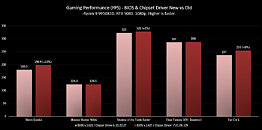
AMD Ryzen 9 9950X3D Performance Boost: MSI BIOS Optimizations Deliver up to 14.5% Gain
AMD's Ryzen 9 9950X3D processor with 16 cores, 32 threads, and 3D V-Cache is an exceptional content creation and gaming workload machine. However, MSI's proprietary BIOS features reportedly enable substantial performance headroom beyond stock settings. MSI's latest internal testing confirms that specific firmware configurations can deliver up to 14.5% performance improvements in demanding titles like Monster Hunter Wilds. The performance uplift hinges on firmware update, with MSI recommending the installation of chipset driver v7.01.08.129 or higher, which includes the critical AMD Application Compatibility Database driver. Users who update to BIOS versions featuring AGESA 1.2.0.3 or newer may encounter an "Unknown Device" in Device Manager, which can be resolved by installing the AMD Application Compatibility Database driver included in the latest chipset package. When paired with AGESA 1.2.0.3+ BIOS implementations, this configuration yields measurable framerate improvements of approximately 10% in Metro Exodus and 8% in Far Cry 6 at 1080p resolution compared to legacy firmware.
MSI's BIOS feature suite provides several optimization pathways. Memory Try It! delivers pre-configured memory timing profiles, while High-Efficiency Mode optimizes graduated memory bandwidth across four performance tiers. The X3D Gaming Mode modifies core and SMT configurations and provides additional gaming-specific enhancements, though potentially at the expense of multi-threaded application performance. Benchmark data from MSI demonstrates that implementing DDR5-8000 CL38 Memory Try It! profiles alongside "Tighter" High-Efficiency Mode settings and X3D Gaming Mode activation delivers a 14.5% performance uplift in Monster Hunter Wilds compared to baseline DDR5-4800 configurations, and approximately 8% over XMP DDR5-7200 settings. Titles like Shadow of the Tomb Raider and Far Cry 6 both recorded approximately 6% performance gains under similar test conditions. MSI cautions that memory overclocking implementations may impact system stability, while X3D Gaming Mode's thread management modifications could reduce performance in heavily multi-threaded workloads. Performance benefits will necessarily vary based on GPU capabilities and system configuration.
MSI's BIOS feature suite provides several optimization pathways. Memory Try It! delivers pre-configured memory timing profiles, while High-Efficiency Mode optimizes graduated memory bandwidth across four performance tiers. The X3D Gaming Mode modifies core and SMT configurations and provides additional gaming-specific enhancements, though potentially at the expense of multi-threaded application performance. Benchmark data from MSI demonstrates that implementing DDR5-8000 CL38 Memory Try It! profiles alongside "Tighter" High-Efficiency Mode settings and X3D Gaming Mode activation delivers a 14.5% performance uplift in Monster Hunter Wilds compared to baseline DDR5-4800 configurations, and approximately 8% over XMP DDR5-7200 settings. Titles like Shadow of the Tomb Raider and Far Cry 6 both recorded approximately 6% performance gains under similar test conditions. MSI cautions that memory overclocking implementations may impact system stability, while X3D Gaming Mode's thread management modifications could reduce performance in heavily multi-threaded workloads. Performance benefits will necessarily vary based on GPU capabilities and system configuration.



















































